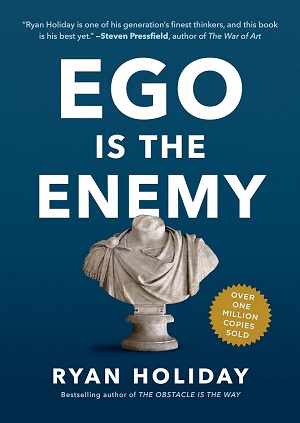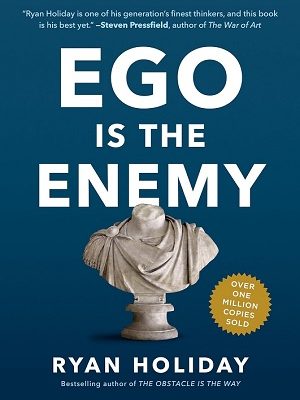Ryan Holiday’s Ego Is the Enemy is a profound exploration of how ego can sabotage personal and professional growth. Drawing from ancient philosophy and modern examples, Holiday explains how our obsession with self-importance often becomes our biggest obstacle. Below is an in-depth look at the key lessons from the book:

Read: The Organized Mind
1. Ego is Our Enemy
- Key Lesson: Ego distorts reality and hampers personal progress.
- Explanation: Holiday opens with the central premise that ego is our biggest internal adversary. Ego clouds our judgment, makes us overestimate our abilities, and causes us to ignore the input and needs of others. By recognizing the destructive power of ego, we can begin to minimize its influence.
2. Aspire: Humility and Learning Over Ego
- Key Lesson: Aspire to learn and grow, not to inflate your ego.
- Explanation: Holiday stresses that when we aspire to achieve something great, the ego often gets in the way by pushing us to focus on our image or how others perceive us rather than on doing the actual work. He encourages humility and emphasizes that learning, not image, should be the focus of our efforts.
3. Stay a Student
- Key Lesson: Always maintain a beginner’s mindset.
- Explanation: One of the most important lessons in the book is the value of staying humble by always considering yourself a student, no matter how successful you become. Ego makes us think we’ve “arrived” and no longer need to learn. To counter this, Holiday advises constantly seeking knowledge and feedback.
4. Don’t Be Passionate
- Key Lesson: Passion without purpose leads to failure.
- Explanation: Holiday challenges the popular advice to “follow your passion,” pointing out that unchecked passion can lead to overconfidence and rash decisions. Instead, he advocates for pursuing clear, strategic goals with discipline and purpose, rather than letting the ego-driven passion take over.
5. Follow the Canvas Strategy
- Key Lesson: Serve others and provide value rather than seeking attention.
- Explanation: The “Canvas Strategy” refers to a method of advancing your career and life by clearing the path for others and letting them shine. Instead of seeking credit, ego-free individuals focus on how they can help others succeed. This selfless approach often leads to more long-term success and personal growth.
6. Work, Work, Work
- Key Lesson: Consistent effort is more important than attention-seeking.
- Explanation: Ego often leads us to seek recognition and validation prematurely. Holiday argues that true success comes from continuously putting in the hard work, even when no one is watching or offering praise. It’s about building long-term results rather than chasing quick, ego-driven wins.
7. Kill Your Darlings
- Key Lesson: Let go of what no longer serves your goals.
- Explanation: In the creative and professional world, “killing your darlings” refers to the process of letting go of ideas, projects, or even relationships that may have once been important but are now holding you back. Ego clings to these out of fear or pride, but success requires the ability to make difficult decisions to keep moving forward.
8. Get Out of Your Own Head
- Key Lesson: Don’t overthink or overestimate your importance.
- Explanation: Holiday emphasizes the importance of getting out of your own head and not letting the ego inflate your sense of self-importance. Overthinking and self-obsession hinder productivity and cloud judgment. He recommends focusing on actions rather than internal monologues or ego-driven narratives.
9. Avoid Entitlement
- Key Lesson: You are not owed anything; you have to earn it.
- Explanation: Ego makes us feel entitled to success, recognition, or rewards without putting in the necessary effort. Holiday warns against this mindset, pointing out that nobody owes us anything. The path to achievement requires continuous effort, not entitlement or expectations of special treatment.
10. Resist the Disease of Me
- Key Lesson: Prioritize the team over your personal glory.
- Explanation: Borrowing from former NBA coach Pat Riley, Holiday discusses the “Disease of Me,” where ego drives individuals to prioritize their own success over the collective good of the team. In any group effort, whether professional or personal, success comes from collaboration, not from an individual seeking personal glory.
11. Meditate on the Immensity of Things
- Key Lesson: Stay grounded by recognizing the vastness of the universe.
- Explanation: Ego often makes us feel overly significant, causing us to lose perspective. Holiday suggests reflecting on the enormity of life, the universe, and history to remind ourselves of how small we are in the grand scheme of things. This helps keep the ego in check and cultivates a sense of humility.
12. Find Mentors, Not Enemies
- Key Lesson: Surround yourself with people who challenge you.
- Explanation: Ego tends to push us into thinking we know better than others or that we need to compete with everyone around us. Holiday encourages finding mentors and people who can help guide you, rather than seeing everyone as competition. A strong network of mentors and peers keeps your ego grounded and fosters growth.
13. Let Go of Control
- Key Lesson: Don’t try to control everything; focus on what you can influence.
- Explanation: Ego often leads to a need for control, whether in personal relationships or professional settings. Holiday argues that it’s essential to let go of this need and focus only on the things you can actually influence. This acceptance reduces stress and allows for more effective action.
14. Be Objective
- Key Lesson: Keep emotions in check and approach problems rationally.
- Explanation: Ego makes us emotional, leading to clouded judgment and irrational decisions. Holiday stresses the importance of maintaining objectivity, particularly in moments of conflict or failure. By stepping back and analyzing situations without ego, you can make more informed and effective choices.
15. Always Stay a Student
- Key Lesson: Never stop learning, no matter your level of success.
- Explanation: One of the recurring themes in Ego Is the Enemy is the idea that we should always remain students. Ego convinces us that we’ve learned all we need to know, but Holiday argues that success depends on the willingness to continuously grow, adapt, and seek knowledge.
16. Success Is Not the End
- Key Lesson: Success is not a final destination; it requires maintenance and growth.
- Explanation: Ego can trick us into thinking that once we’ve achieved a certain level of success, we no longer need to put in the effort. Holiday warns against this mindset, explaining that success requires ongoing work and humility. Even after achieving goals, there is always more to learn and ways to improve.
17. When Ambition and Ego Collide
- Key Lesson: Keep ambition in check to avoid self-destruction.
- Explanation: Holiday explains that while ambition can be a powerful motivator, it can also lead to ego-driven destruction if left unchecked. The book highlights examples of people who allowed their ambition to spiral out of control, eventually leading to their downfall. He advises maintaining a balance between ambition and humility to achieve sustainable success.
18. Failure: The Greatest Teacher
- Key Lesson: Embrace failure as an opportunity for growth.
- Explanation: Ego often leads to a fear of failure, but Holiday emphasizes that failure is one of life’s most important teachers. Instead of letting ego make you feel devastated by failure, use it as a stepping stone to learn, grow, and move forward. The willingness to face failure humbly opens the door to greater achievements.
19. Cultivate Resilience
- Key Lesson: Develop resilience by shedding ego and embracing perseverance.
- Explanation: Holiday highlights the importance of resilience in overcoming obstacles. Ego tends to make us fragile, prone to giving up at the first sign of trouble. By shedding the ego, you develop the strength to endure challenges and setbacks, knowing that perseverance ultimately leads to success.
20. Ego’s Role in Leadership
- Key Lesson: Ego-free leadership is more effective and enduring.
- Explanation: Holiday points out that great leaders are those who lead without ego. Ego-driven leaders seek personal recognition and control, while effective leaders prioritize their team and the mission over themselves. By removing ego from leadership, you create a healthier, more collaborative, and successful environment.
Conclusion
Ryan Holiday’s Ego Is the Enemy offers a powerful critique of how ego, when unchecked, becomes a barrier to success and personal fulfillment. By focusing on humility, continual learning, resilience, and self-awareness, you can keep ego at bay and unlock true growth and achievement. Each lesson in the book serves as a guide for navigating personal ambition, failures, and successes while remaining grounded and focused on long-term, meaningful progress. Whether you’re striving for success in your career or personal life, mastering your ego is a key step to living a more fulfilling and effective life (Amazon).



